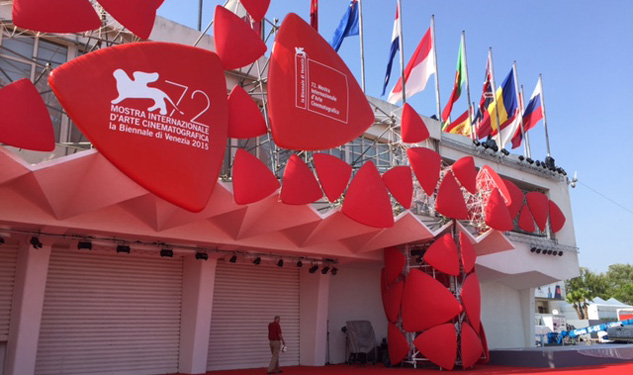
- Festivals
The Festival Bubble and The Mirror of Reality
As Venezia 72 comes to an end with the award ceremony on Saturday night, we contemplate the last 10 days. It is the nature of film festivals that attendees live in a bubble, largely shut off from the world and insulated from any reality but their own – mostly tight and busy – schedule. As far as festivals go, Venice offers a particularly beautiful bubble thanks to its gorgeous island setting. And it is not just geography but the films that are presented with such ease and convenience. Add to that fairly inexpensive world-class cuisine and you have the perfect combination of art and life. Only that life is restricted to a handful of isolas scattered around the Adriatic Sea.
Tragedies happen on screen, not in front of us. Whether it is a bunch of inexperienced climbers who fall off the planet’s highest mountain in Everest, the opening night film, or innocent boys being recruited as child soldiers by a menacing Idris Elba in Beasts of No Nation. Whether you have gangsters killing each other (and a few innocent people) in South Boston, as in Black Mass or in Argentina as in El Clan. History is a lot older on a movie screen than it is in the 24 hour news cycle: World War 1 and postwar England, ancient warriors in Asia. Documentaries about the short life and sad death of a rockstar (Janis) and films about runaway teenagers (Looking for Grace). Current events – or rather events that are still current and are still taking place – are few and far between: the aforementioned rebels in Africa in Beasts of No Nation, soldiers’ post traumatic stress disorder from Afghanistan and Iraq in Dito Montiel’s Man Down, starring Shia LaBeouf, and the sex scandals in the Boston Archdiocese in Spotlight.
Even the one refugee scene in A Bigger Splash, as current as a film scene could possibly get, only got a lot of attention among journalists covering the official press conference as well as the junket because real-life news over the last weekend had upstaged it, as tens of thousands of refugees from Syria, Iraq and Afghanistan finally made it across the Hungarian border into Austria and Germany.
This was the one event that made the bubble burst for some of us from countries close enough to be part of it. As my Viennese friends and family rushed to the train stations with clothes, food and toys for the refugee families and their kids, I was all too aware of the dichotomy between reality and the bubble of prosecco and movie stars we were in at the festival. While we were moved to tears over the beautiful human story of The Danish Girl, people at the train stations and camps cried over the horrible brutality that led millions of human beings whose social status was just like ours only a few years ago, to get on dangerous boats and walk through Europe. Tilda Swinton, the lead of A Bigger Splash, corrected a few reporters that asked about the scene in the film versus reality: “Let’s please all agree to not call them migrants. These are refugees, human beings who endure terrible hardship and loss.” That fact was also a theme of the “Barefoot March” by one thousand immigrant rights activists who walked the length of the Lido to just in front of the Festival on Friday.
Venice is known to be a political festival. Its directors have never shied away from programming films with critical themes, and the festival media has never been timid about arguing these topics with artists and filmmakers, be they religious, social, economic or political. This year it feels as though any cinematic exploration or discussion paled in comparison to reality. And so the last ten days have been even more of a bubble than in
the past.
Elisabeth Sereda

